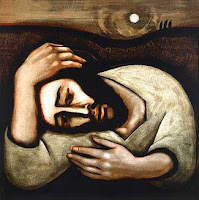Last Sunday our community's scripture readings turned toward endings, a direction that the Tuesday and Tuesday Too groups have also been headed.
Coming to the end of Jonah's story, I couldn't help but notice that it looked more like a beginning. It's open, unresolved. How would you write the end of Jonah's journey with God (Jonah 4)? Has he reached the end of his resistence....or will he make another dash for it!?
We tend to like our stories to end happily. We live in a culture that, as Matthew Fox puts it, "tends to define happiness as absense of suffering." So, he continues, "we strive to invest our creative powers in building temples to security, whether they be the immortal marriage, the immortal job, the immortal corporation or the immortal skyscraper to house that corporation, or the immortal Nations with its invincible army and weaponry."
No wonder we put off encountering the suffering and death Holy Week's scripture heads us towards. There's a lack of security in the notion that the Messiah, much less God, could die.
(Jacob Stienhardt's "Jonah") Does happiness =absence of suffering?
What is the end of life, the goal we live for?
Fox goes on to share Pierre Boulez's definition of what life is about. "The goal of life is not happness (aka security); it is living." And living, both the gospel and Fox remind us, implies suffering. "In fact, the creative person--and that hopefully is all of us--takes on additional burdens of suffering by entering fully into living." (A Spirituality Called Compassion).
When the ancient Greek philosophers and early Church theologians talked about life's end, they meant end as "telos," the purpose God plants in our life, what organizations and gives structure to our life. It is our reason for being, what we are aimed at. If we are pursuing the avoidance of suffering, then defense is our structure. If we aim at the alleviation of pain, sin, death, then our purpose draws us through rather than around suffering.
So in Jesus' end he suffers.
It is in the end of that great suffering that he encounters God's greatest mercy-God's life.
God's very being is mercy. The mercy of God lies in God's readiness to share in sympathy the distress of another, a readiness which springs from God's inmost nature and stamps all with God's being and doing...And this, of course, is why we are able to face, acknowledge, accept and live through suffering, for we know that it can never be found ultimate, it can never constitute the bottom line. God is at the foundation and God is at the boundaries. (Eugene Petersen, A Long Obeidience in the Same Direction).
The walk we imagine Jesus on this week is a walk toward God's ultimate end, toward the mercy full bottom line.
A prayer of Confession for the early days of Holy Week
Loving, Living, Gracious God,
we confess that we fear suffering,
not just for ourselves, but for those we love.
We point fingers at those we blame,
the ones over there,
the ones in here,
ourselves.
But you would push those pointing hands down,
asking us, as they go lower, lower,
what our deepest need really is.
Offering to show us,
while we're down there,
what our deepest gift is as well.
We confess that we are reluctant to let those gifts be loosed in your service.
What if they break? What if we misuse them?
Forgive us for underestimating ourselves,
our capacity for wrong,
and our capacity for right.
Unclench the fists we close.
Open our palms up
and up and up
to receive your gifts:
assurance
faith
peace.



No comments:
Post a Comment